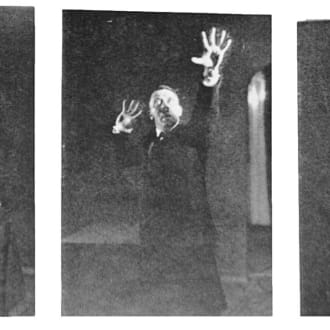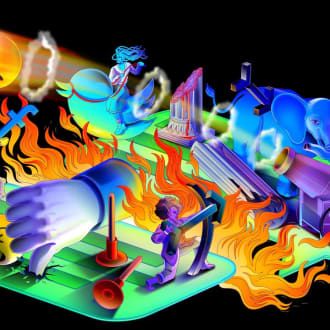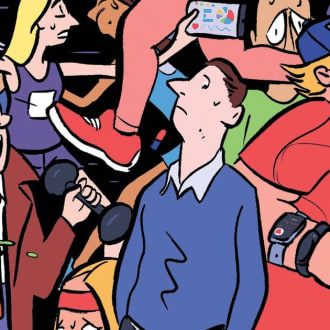The Best of The New Yorker
20+ most popular The New Yorker articles, as voted by our community.
New this Week
These are fresh off the press.
The “Epic Row” Over a New Epoch
Scientists, journalists, and artists often say that we live in the Anthropocene, a new age in which humans shape the Earth. Why do some leading geologists reject the term?
Trending
These are currently making the rounds on Refind.
So You Think You’ve Been Gaslit
What happens when a niche clinical concept becomes a ubiquitous cultural diagnosis.
The Forgotten History of Hitler’s Establishment Enablers
The Nazi leader didn’t seize power; he was given it.
Are Flying Cars Finally Here?
They have long been a symbol of a future that never came. Now a variety of companies are building them—or something close.
Inside North Korea’s Forced-Labor Program in China
Workers sent from the country to Chinese factories describe enduring beatings and sexual abuse, having their wages taken by the state, and being told that if they try to escape they will be “killed…
Maggie Nelson on the Conversations She Wants to Be Having
The author of “The Argonauts” and the new collection “Like Love” discusses the performative aspect of writing, reading her old work, and becoming “lightly interested” in genre for the first time.
The New Yorker on Books
What’s the Point of Reading Writing by Humans?
Maybe one day journalism could be replaced with an immense surveillance state with a GPT-4 plug-in. Why would we want that?
The Best Books of 2022 So Far
Reviews of the year’s notable new fiction, poetry, and nonfiction.
The New Yorker on Comics
How “Peanuts” Created a Space for Thinking
Charles Schulz’s beloved comic strip invited readers to contemplate the big picture on a small scale.
The Debt That All Cartoonists Owe to “Peanuts”
If there is one cartooning accomplishment for which Charles Schulz should be credited, it’s that he brought into comics a broader visual language of emotion and empathy.
The New Yorker on Culture
The Tyranny of the Tale
We’re told that story will set us free. But what if a narrative frame is also a cage?
How an Amateur Diver Became a True-Crime Sensation
Jared Leisek carved a lucrative niche in the YouTube sleuthing community. Then the sleuths came for him.
The New Yorker on Fiction
The Case Against the Trauma Plot
Fiction writers love it. Filmmakers can’t resist it. But does this trope deepen characters, or flatten them into a set of symptoms?
How William Gibson Keeps His Science Fiction Real
Midway through his career, the inventor of “cyberspace” turned his attention to a strange new world: the present.
The New Yorker on Politics
Elon Musk’s Shadow Rule
How the U.S. government came to rely on the tech billionaire—and is now struggling to rein him in.
American Democracy Isn’t Dead Yet, but It’s Getting There
A country that cannot even agree to investigate an assault on its Capitol is in big trouble, indeed.
«When Joe Biden was a Presidential candidate, he carried around a wonkish book of international comparative politics by two Harvard professors, “How Democracies Die,”»
The New Yorker on Race
The Genius of Toni Morrison’s Only Short Story
In the extraordinary “Recitatif,” Morrison withholds crucial details of racial identity, making the reader the subject of her experiment.
The Fight to Redefine Racism
In “How to Be an Antiracist,” Ibram X. Kendi argues that we should think of “racist” not as a pejorative but as a simple, widely encompassing term of description.
The New Yorker on Russia
Why John Mearsheimer Blames the U.S. for the Crisis in Ukraine
For years, the political scientist has claimed that Putin’s aggression toward Ukraine is caused by Western intervention. Have recent events changed his mind?
The New Yorker on Trump
Doomsday Prep for the Super-Rich
Some of the wealthiest people in America—in Silicon Valley, New York, and beyond—are getting ready for the crackup of civilization.
Donald Trump’s Ghostwriter Tells All
In “The Art of the Deal,” Tony Schwartz helped create the myth that Trump is a charming business genius. Now he calls him unfit to lead.
The New Yorker on TV
How Much More Netflix Can the World Absorb?
Bela Bajaria, who oversees the streaming giant’s hyper-aggressive approach to TV-making, says success is about “recognizing that people like having more.”
The New Yorker on World
An American Tragedy
The electorate has, in its plurality, decided to live in Trump’s world of vanity, hate, arrogance, untruth, and recklessness.
Christopher Steele, the Man Behind the Trump Dossier
How the ex-spy tried to warn the world about Trump’s ties to Russia.
Popular
These are some all-time favorites with Refind users.
Why Facts Don’t Change Our Minds
New discoveries about the human mind show the limitations of reason.
We Know Less About Social Media Than We Think
There’s a general sense that social media is harmful—and that may be right. But studies offer surprisingly few easy answers.
How the Internet Turned Us Into Content Machines
Two new books examine how social media traps users in a brutal race to the bottom.
A Guide to Getting Rid of Almost Everything
Once you’ve thanked and said goodbye to the items that do not spark joy, what can you do with them?
Improving Ourselves to Death
What the self-help gurus and their critics reveal about our times.
What is Refind?
Every day Refind picks the most relevant links from around the web for you. is one of more than 10k sources we monitor.
How does Refind curate?
It’s a mix of human and algorithmic curation, following a number of steps:
- We monitor 10k+ sources and 1k+ thought leaders on hundreds of topics—publications, blogs, news sites, newsletters, Substack, Medium, Twitter, etc.
- In addition, our users save links from around the web using our Save buttons and our extensions.
- Our algorithm processes 100k+ new links every day and uses external signals to find the most relevant ones, focusing on timeless pieces.
- Our community of active users gets the most relevant links every day, tailored to their interests. They provide feedback via implicit and explicit signals: open, read, listen, share, mark as read, read later, «More/less like this», etc.
- Our algorithm uses these internal signals to refine the selection.
- In addition, we have expert curators who manually curate niche topics.
The result: lists of the best and most useful articles on hundreds of topics.
How does Refind detect «timeless» pieces?
We focus on pieces with long shelf-lives—not news. We determine «timelessness» via a number of metrics, for example, the consumption pattern of links over time.
How many sources does Refind monitor?
We monitor 10k+ content sources on hundreds of topics—publications, blogs, news sites, newsletters, Substack, Medium, Twitter, etc.
Can I submit a link?
Indirectly, by using Refind and saving links from outside (e.g., via our extensions).
How can I report a problem?
When you’re logged-in, you can flag any link via the «More» (...) menu. You can also report problems via email to hello@refind.com
Who uses Refind?
450k+ smart people start their day with Refind. To learn something new. To get inspired. To move forward. Our apps have a 4.9/5 rating.
Is Refind free?
Yes, it’s free!
How can I sign up?
Head over to our homepage and sign up by email or with your Twitter or Google account.





























